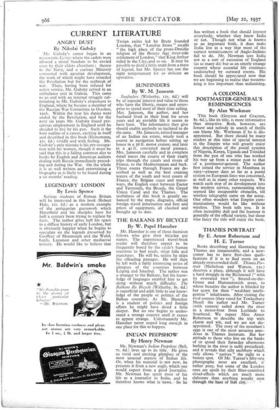Serious students of Roman Britain will be interested in this
book (Robert Hale, I2S. 6d.) as a modern example of the antiquarian guesswork which Haverfield and his disciples have for half a century been trying to replace by facts. The author gives half his space to a diffuse history of early London, but is obviously happier when he begins to speculate on the legends preserved by Geoffrey of Monmouth and the Welsh bards, Layamon and other mediaeval writers. He would like to believe that Trojan- exiles led by Brute founded London, that " London Stone " recalls " the high place of the proto-Druidic religion of the Bronze Age river-side settlement of London," that King Arthur ruled in the City, and so on. It may be possible to distil a little truth from a mass of legend, but Mr. Spence has not the right temperament for so delicate an operation.














































 Previous page
Previous page